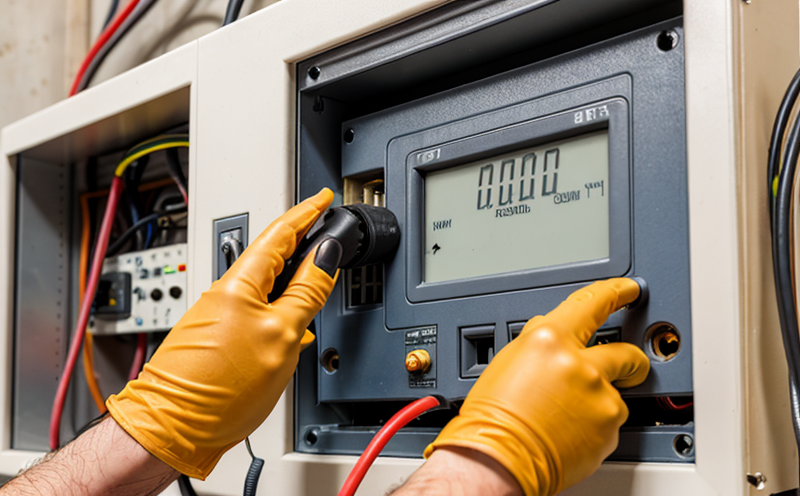JIS C8714 Electrical Functional Testing of Lithium-Ion Battery Packs
The JIS C8714 standard is a critical guide for ensuring the safety and performance of lithium-ion battery packs. This testing procedure evaluates electrical functionality, thermal management systems, and overall safety features under various conditions. Compliance with this standard ensures that battery packs meet stringent quality requirements set by industry stakeholders.
Lithium-ion batteries are widely used in portable electronics, electric vehicles, and renewable energy storage solutions due to their high energy density and long cycle life. However, the complexity of these systems necessitates thorough testing to prevent failures that could lead to hazardous situations. JIS C8714 provides a comprehensive framework for assessing battery packs' electrical performance through rigorous functional tests.
The primary objective of this test is to identify potential weaknesses in the design and manufacturing process before they become critical issues during use. By adhering to JIS C8714, manufacturers can ensure their products meet international safety regulations and industry best practices. This not only enhances product reliability but also fosters trust among consumers and regulatory bodies.
One of the key aspects of JIS C8714 testing involves evaluating the battery pack's ability to withstand various stress conditions such as overcharging, overheating, short circuits, and mechanical abuse. These tests simulate real-world scenarios that might occur during product usage or transportation, helping manufacturers identify any vulnerabilities early on.
Another important element of this standard is its focus on protecting against fire hazards by ensuring proper thermal management systems are in place within the battery pack. The test procedures outlined in JIS C8714 help verify whether these protective measures function correctly under extreme conditions. This ensures that even if unexpected incidents do occur, they can be contained safely without posing a risk to end-users.
For quality managers and compliance officers responsible for ensuring product integrity, adherence to JIS C8714 provides peace of mind knowing that their company’s lithium-ion battery packs are up-to-date with the latest safety standards. Additionally, this standard supports research & development teams in continuously improving battery design through iterative testing cycles.
When selecting a laboratory capable of conducting JIS C8714 tests, it's essential to look for one experienced not only in performing these specific procedures but also in providing detailed reports that outline all findings from each test run. Such transparency allows stakeholders to make informed decisions about product improvements and potential recalls if necessary.
By investing time and resources into JIS C8714 testing, organizations demonstrate their commitment to producing high-quality products that meet both local and international safety standards. This approach ultimately contributes to building a safer environment for all users while maintaining competitive advantage within the market space.
Applied Standards
JIS C8714 is based on several internationally recognized standards including ISO 6304-2, which sets out guidelines for determining battery capacity; IEC 62133, which covers safety requirements for lithium-ion cells and batteries used in portable applications; and UL 1973, which provides additional protection measures specifically tailored towards electric vehicle charging systems. These combined standards ensure that JIS C8714 remains aligned with global best practices while addressing unique challenges faced by the industry.
Scope and Methodology
The scope of JIS C8714 encompasses a wide range of electrical functional tests aimed at verifying key aspects of lithium-ion battery packs. These include, but are not limited to:
- Overcharging Protection Test: Verifies the effectiveness of internal protection circuits designed to prevent overcharging which can lead to thermal runaway.
- Short Circuit Resistance Test: Assesses how well the battery pack withstands short circuit conditions without sustaining damage or initiating a fire hazard.
- Thermal Management Evaluation: Examines the ability of the cooling system to maintain optimal operating temperatures during prolonged operation under full load.
- Voltage Balance Check: Ensures that all cells within the battery pack remain balanced, minimizing risk of imbalance-induced failures.
During these tests, technicians follow precise protocols outlined in JIS C8714 to ensure consistent and accurate results. Each test is conducted multiple times to account for variability inherent in real-world conditions. After completion, detailed reports are generated summarizing all findings along with recommendations for improvement where necessary.
Benefits
- Enhanced Safety: By identifying potential hazards early on through rigorous testing, manufacturers can take corrective actions before products reach the market.
- Increased Reliability: Ensures consistent performance across batches by maintaining strict quality control measures during manufacturing processes.
- Better Design Insights: Through iterative testing cycles based on JIS C8714, R&D teams gain valuable insights into areas needing improvement which leads to more robust designs overall.
- Compliance Assurance: Ensures that all produced lithium-ion battery packs comply with relevant international standards thereby avoiding costly penalties associated non-compliance issues.





